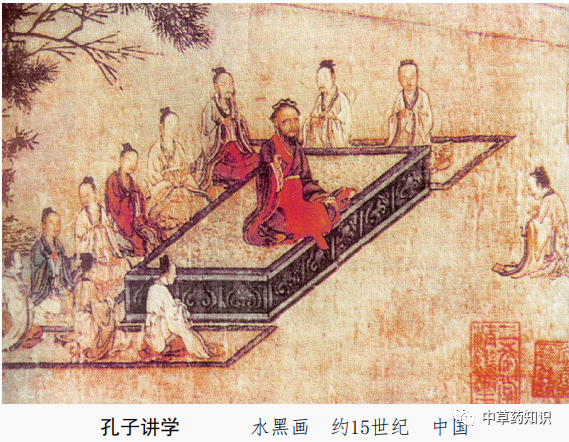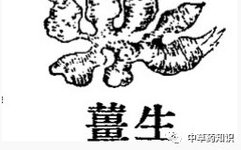Dried Ginger
The Shennong Bencao Jing states: Dried ginger (Gan Jiang), with a pungent flavor and warm nature, is indicated for chest fullness, cough, and difficulty in breathing; it can warm the internal organs, stop bleeding, and induce sweating to expel wind-dampness. For treating diarrhea, fresh ginger (Sheng Jiang) is more effective. Long-term use of dried ginger can eliminate foul odors and clarify the mind. Ginger grows in rocky soil on mountains with flowing water.
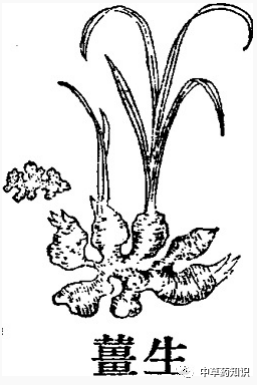
[Original Text] Dried ginger, with a pungent flavor and warm nature, is indicated for chest fullness, cough, and difficulty in breathing; it warms the middle and stops bleeding; induces sweating and expels wind-dampness; treats diarrhea and dysentery. Fresh ginger is especially good. Grows in valleys.
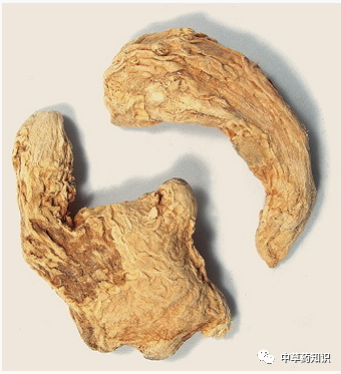
[Explanation of Name] Fresh ginger, used as a seasoning, is called Sheng Jiang in traditional Chinese medicine. When dried, it becomes Gan Jiang. After processing, it is also known as Pao Jiang or Jiang Tan. As the saying goes: “Eat garlic in summer and ginger in winter; no need for a prescription from the doctor.” This shows that ginger is a widely effective medicine.
Dried ginger has a pungent flavor and warm nature. It is indicated for chest fullness, cough, dysentery with blood, and wind-dampness pain. It can warm and tonify the middle qi, induce sweating, and stop bleeding. Long-term use can eliminate turbid qi and invigorate the spirit.
The Bencao states that dried ginger has a pungent flavor and warm nature, but from clinical practice, it is more appropriate to say it has a pungent flavor and hot nature. Ginger enters the Spleen, Stomach, Heart, and Lung meridians, so its pungent and hot nature has four major uses: entering the Spleen can warm the meridians, assist the Spleen, and stop bleeding, treating symptoms of cold-induced vomiting, bloody stools, and excessive menstrual bleeding; entering the Stomach can warm the middle and disperse cold, treating symptoms of Spleen and Stomach deficiency cold, loose stools, cold limbs, and weak pulse; entering the Heart can expel wind and induce sweating, promoting blood circulation, but its effect is not obvious and needs to be used in conjunction with wind-dampness herbs to be effective; entering the Lung can clear phlegm and open the orifices, treating symptoms of phlegm-damp cough.
In clinical practice, the properties and effects of ginger vary depending on the processing method: fresh ginger is warm, disperses cold, and stops vomiting and phlegm, treating symptoms like headache from cold damage, cough with reversed qi, and stomach cold pain; dried ginger is hot, good at warming the middle and returning yang, dispersing cold and drying dampness, treating symptoms like weak pulse, cold limbs, cold extremities, Spleen and Stomach deficiency cold, cough with cold phlegm, and loose stools; Pao Jiang is very hot, effective for warming the meridians and stopping bleeding, used for abdominal pain, diarrhea, vomiting blood, and bloody stools. Additionally, ginger peel and ginger juice also have medicinal value. Ginger peel can harmonize the Spleen and promote water metabolism, treating skin edema. Ginger juice can resolve phlegm and stop vomiting, clearing phlegm and opening the orifices.
Modern pharmacological analysis has proven that the rhizome of ginger contains volatile oils such as zingiberene, watercressene, gingerol, and gingerone, which can stimulate gastric juice, increase gastric acid, enhance the activity of fat-decomposing enzymes in the stomach, thereby increasing intestinal tension and peristaltic rhythm; it can also stimulate the medulla oblongata and the heart; promote blood circulation, inhibit dermatophytes and Trichomonas vaginalis; and has an antiemetic effect. However, because dried ginger is a pungent and hot substance, it should not be taken in excess, especially by pregnant women and those with yin deficiency and heat, eye diseases, or hemorrhoids should be cautious in its use.
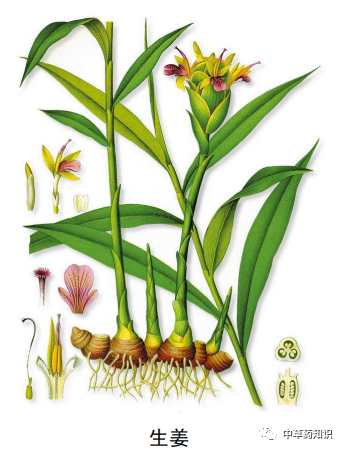
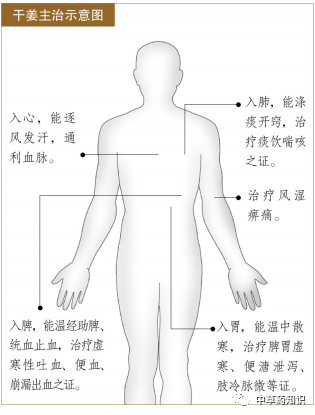
[Therapeutic Formulas] (For reference only)
For treating Spleen and Stomach deficiency cold, with loss of appetite:
Boil white dried ginger in water until thoroughly cooked, remove and dry, then grind into powder. Mix with aged rice porridge to form pills the size of Wutong seeds, taking 30-50 pills with warm water each time. The effect is miraculous.
For treating dizziness and vomiting:
Dried ginger (Pao) 7.8 grams, licorice (stir-fried) 3.6 grams. Boil the above herbs in 360 ml of water until reduced to half and take.
For treating Spleen cold malaria:
Grind equal parts of dried ginger and Galangal into powder. Take 3 grams with 240 ml of water boiled down to 70% and take. Another formula: fry dried ginger until black, then take 9 grams with warm wine at the onset of the disease.
For treating cough and difficulty in breathing:
Dried ginger (Pao), soapberry (Pao, remove skin, seeds, and any infested parts), and cinnamon heart (purple, remove skin) in equal parts. Grind and sift the above herbs, then mix with honey to form pills the size of Wutong seeds, taking 3 pills with water each time. Take immediately when coughing occurs, 3-5 times a day. Avoid eating scallions, wheat, and oily foods.
For treating persistent vomiting of blood:
Grind dried ginger into powder and take with children’s urine.
For treating red, painful eyes:
Grind white ginger into powder, mix with water, and apply to the soles of the feet.
For treating persistent toothache:
Grind equal parts of Chuan ginger (Pao) and Chuan pepper into powder and apply to the affected area.
Longevity and the Benefits of Ginger:
The famous Northern Song dynasty writer and gourmet Su Dongpo recorded a story in the Dongpo Miscellany about someone who lived a long life by regularly consuming fresh ginger. At that time, Su Dongpo was the governor of Hangzhou and once visited the Jing Tang Temple in Hangzhou, where he encountered a monk who claimed to be the “King of Medicinal Herbs,” who was over eighty years old but had a rosy complexion and bright eyes. Curious, he asked the monk for longevity and health tips. The monk claimed to have consumed fresh ginger for over 40 years, which is why he remained youthful.In older adults, age spots often appear on the face, which is actually a manifestation of “body rust” produced internally, caused by excessive free radicals in the body. Scientific research has confirmed that ginger contains gingerol, which has a strong ability to combat free radicals. Therefore, regularly consuming ginger can promote longevity.As early as the Spring and Autumn period, Confucius recognized the longevity effects of ginger. He consumed ginger throughout the year but in moderation, only a few slices after each meal. In that tumultuous time of war and hardship, Confucius lived to 73 years old, which cannot be unrelated to his regular consumption of ginger.
